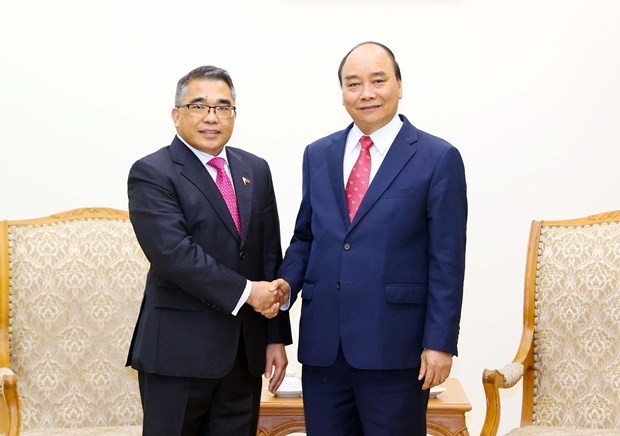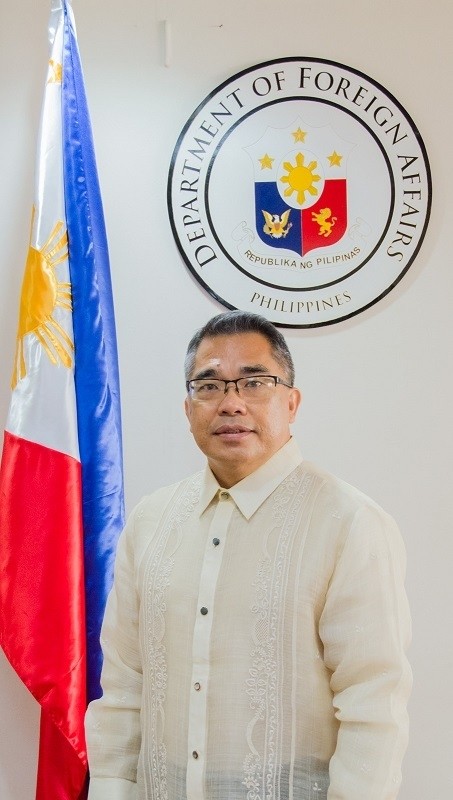
Philippines Ambassador: Vietnam is gained expertise in various important international spheres
Latest
 |
| Meeting of Ambassador Meynardo LB. Montealegre (left) with President of Viet Nam Nguyen Xuan Phuc on March 17, 2021. (Source: VNA) |
Could you please share us the meanings and main focuses of Vice President of the Philippines Sara Duterte-Carpio’s official visit to Viet Nam?
We were informed that Vice President Sara Duterte-Carpio was invited to attend the 12th ASEAN Education Ministers Meeting (12th ASED) and related Senior Officials Meetings on Education (SOM-ED) in Hanoi from 11 to 14 October 2022.
As you may know, Vice president Duterte-Carpio is also the Secretary (Minister) of Education following her appointment to this position by President Ferdinand R. Marcos, Jr. Due to equally pressing concerns and prior commitments, the Vice President has designated Undersecretary (Deputy Minister) Gerard Chan to be her representative in the 12th ASED.
We expect through these meetings, ASEAN states and the dialogue partners will be able to reassess and identify further areas of collaboration among ASEAN member states and dialogue partners, particularly in light of new current challenges affecting the education sector especially after the COVID-19 pandemic.
The Philippines is the 5th largest trading partner and the largest rice importer of Vietnam. What are your assessments about the potentials of economic cooperation between the two countries in the coming time, towards recovery and sustainable development?
I think the bilateral trade between the Philippines and Vietnam is still below its full potential. The increase in production cost and freight charges due to rising fuel prices as well as supply disruption are major challenges to manufacturers and service providers across countries.
I believe the positive aspect between Philippines and Vietnam trade relations is that we can take advantage of the considerable short physical distance between Vietnam and the Philippines compared to our other trading partners. There are also a lot of Philippine companies which are looking for potential sources of supplies and inputs, and I think that the Philippines Embassy can help them find a match here in Vietnam.
 |
| Philippine Ambassador to Vietnam Meynardo LB. Montealegre. (Souce: VTC News) |
Philippines has recently established our trade and investment office in Vietnam after 11 years. With a dedicated Commercial Attaché, I am confident that this development will help not only Philippine traders and investors know more about the market potential of Viet Nam, but for Vietnamese businessmen who are also looking for investment and trade opportunities to know more about the potential of the Philippines’ growing economy.
What bilateral and multilateral cooperation frameworks will be important foundations for economic cooperation?
International economic cooperation agreements have become more interrelated yet complex through the last three decades, particularly since the establishment of the World Trade Organization.
For the ASEAN region, some of the important foundational agreements on economic cooperation would be the ASEAN free trade agreements such as the ASEAN Trade in Goods Agreement (ATIGA), the ASEAN Comprehensive Agreement, the ASEAN Framework Agreement on Services as well as the ASEAN Agreements on the Movement of Natural Persons, and the Mutual Recognition Arrangement on Services.
Due to the long history of diplomatic relations between the Philippines and Vietnam, we have been able to sign the following economic agreements: Agreement on the Promotion and Protection of Investments that took effect in 1993, Trade Agreement signed in 1978, and the Agreement on Avoidance of Double taxation and Prevention of Fiscal Evasion with Respect to Taxes on Income in 2003.
In your opinion, what do the two nations need to push to further promote the Strategic Partnership as well as the cohesion in the “common roof” of ASEAN in the current context?
Continuous bilateral dialogue and consultations undoubtedly help not only both Vietnam and the Philippines but ASEAN region as well. Now that the momentum for economic recovery has been regained, there is an equal need to speed up economic cooperation as specified in the Plan of Action for the Implementation of the Strategic Partnership for 2019 to 2024.
Both sides are mutually committed to ensure free trade and to resolve barriers or concerns pertaining to trade. We expect that the Joint Trade Committee will meet early next year to resume the discussion on any trade-related concern between both sides.
Our strategic partnership with Vietnam transcends economic cooperation. Both the Philippines and Vietnam share a common aspiration to ensure adherence to international law and peaceful resolution of any dispute. Both have primordial objective, which is to ensure peace, stability, security and freedom of navigation and aviation in the region while respecting and recognizing our respective national interests. These common aspirations are part of the foundation of our deep and long-lasting relationship with Viet Nam.
Also spelled out in our Plan of Action for 2019 and 2024 is the active promotion of business opportunities between the Philippines and Vietnam. In the coming months, we expect a revival of trade and investment missions between our two countries especially after travel restrictions posed by the Covid-19 pandemic have been eased. Within the ASEAN framework and bilaterally, both the Philippines and Vietnam also continuously cooperate in various fields such as science and technology, modern and sustainable agriculture and fisheries, education and cultural cooperation as well as issues related to climate change.
Towards the last half of 2022, we have seen a revival of face-to-face interactions among Philippine and Vietnamese officials in different forums. We expect that these engagements will intensify next year and in the succeeding years in preparation for the 50th anniversary of our diplomatic relations with Vietnam in 2026. Next year, we expect more intense people-to-people engagements, which will help bring our diplomatic relationship to greater heights.
How do you evaluate Vietnam’s efforts on multilateral forums in recent times?
Vietnam has contributed to various multilateral forums in recent years. Viet Nam was able successfully fulfill its role as a non-permanent member of the UN Security Council for 2020 to 2021, which contributed to ensuring that the interest of the ASEAN is brought to the UN.
I also laud Vietnam’s re-election to the UNESCO Executive Board for 2021 to 2025 as well as to the International Law Commission. It has been a gracious and steadfast host of the Asia-Pacific Economic Summit in 2017. It surmounted numerous challenges during its chairmanship of the ASEAN in 2020, and was a dependable host of the Southeast Asian Games this year. Vietnam has also agreed to host to a representative office of the Permanent Court of Arbitration (PCA), which will be the second overseas representative office of the PCA within ASEAN.
In all of these forums, Vietnam has undoubtedly demonstrated that it has gained expertise in various important international socio-economic and political spheres and issues, which not only helped raise the prestige of the ASEAN region but has helped ensure that an ASEAN perspective remains part of the discussion. I am confident that Viet Nam will be able to fulfill more complex roles in other multilateral forums.













